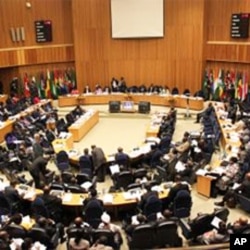A participant in the African Peer Review Mechanism (APRM), which promotes good governance on the continent, told VOA the process continues to function.
The APRM was started in 2003 to encourage conformity among participating African countries with regards to democracy, political, economic and socio-economic governance. Some have suggested it has been silent lately.
Attorney Akere Muna is a former chairman of Transparency International-Cameroon and an eminent person in the African Review Mechanism.
He said African leaders should listen to the peer review recommendations if they are to avoid what is happening in Tunisia and Egypt.
“I think it’s the most important process and that you ask me this question, when the African Union is meeting to talk about ‘shared values,’ I think the Peer Review system is at the heart of it. The fact that it has been discrete doesn’t mean that it was dead. So, I think it is robust,” he said.
Mr. Muna said the Peer Review Mechanism might have had more visibility from its inception because its eminent persons included African leaders like former South African President Thabo Mbeki and Nigeria’s Olusegun Obasanjo, and also because it was intricately linked to the New Partnership for Africa’s Development (NEPAD).
He said African leaders should see APRM as a mirror through which they can see themselves and account for their leadership to their own citizens.
“Like you’re asking me, ‘Let me ask you why you need a mirror?’ You need to have the advantage of having a system whereby people whose fate are linked to yours can tell you the truth, and I think that’s what it’s about. So, it’s like a family talking to each other to make sure that all of us can be better of tomorrow,” he said.
Muna said African leaders should listen more to the peer review recommendations if they are to avoid what is happening in Tunisia and Egypt.
“We are hoping that the work we do is in the interests of leaders who have the interest of their people at heart. So, when you think about a country like Tunisia and what’s happening there, then many leaders will think again that they need to listen more, and peer review system is one of those listening devices,” Muna said.
He said the eminent persons of the African Peer Review Mechanism do consider all aspects of governance when they review a country, including term limit if that is part of a participating country’s constitution.
“The term of office doesn’t really matter; it is how one stays in power that really matters. I think the question is respecting the constitution. If the constitution doesn’t have terms of office, it’s not a problem. But, if your constitution has one and you take it out, then that’s something else. So, the question is do you have a system that has the interest of its people at heart? Is the system functioning in such a manner as to be relevant for the survival and existence of its own people? Those are the things that we look at,” Muna said.
The APRM conducts periodic reviews of participating countries to assess progress being made towards achieving the goals of democracy and political and economic governance.
Muna presented the country review of Ethiopia at the 14th Forum of heads of state and government of the APRM held Saturday in the Ethiopian capital, Addis Ababa, on the sidelines of the African Union summit.





